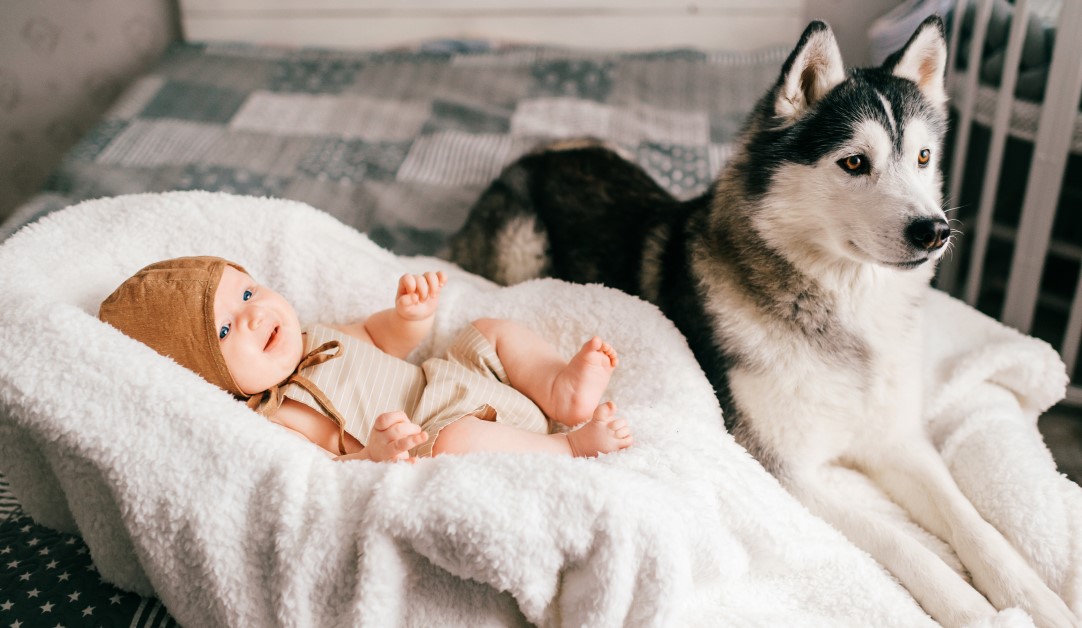How to Prepare a Dog For a New Baby
Some smart preparations can help your dog welcome your new baby more easily.

If you're expecting a baby -- congratulations! The new arrival will doubtless fill your life with joy, despite the inevitable challenges. One of those challenges may involve making your dog comfortable with the notion of a baby in the house. To ensure that both your new human baby and your four-legged fur baby get along like siblings, let's take a look at what you can do to prepare your dog for this major change in your lives.
Train Your Dog Now for Better Behavior Later
A well-trained pup will obviously be easier to control around your fragile new arrival, so it makes perfect sense to start that training as soon as you've heard the good news from your doctor. Teaching your dog basic yet critical commands such as "Sit," "Stay," "Down," Come," "Go away," and "Leave it" will help you keep your pup from jumping on your baby, messing around with the baby's toys, and getting into places it shouldn't (such as the crib).
Your dog may already know how to walk on a leash -- but has it ever had to walk alongside a stroller? Dogs can become oddly aggressive around this unfamiliar piece of hardware, potentially making them forget their usual leash manners. Train your dog to accept the stroller by pushing an empty stroller around on those daily walks. Reward calm behavior and acceptance of the stroller with treats.
Set the Scene
In addition to stroller training, preparing your dog for your new baby also means creating the right environment at home. As you set aside nursery space, purchase baby items, and make sure the home is safe for little family members, you'll need to think about what degree of interaction your baby and your dog will have in that shared space -- and how new sensory experiences might affect your canine friend.
Should your dog have access to the baby's room? The installation of baby gates can give you that option, along with the means of limiting access as needed. Unlike a closed door, baby gates allow your dog to see you and the baby together, allowing it to feel included and get used to the mother-baby connection.
Babies undoubtedly bring new sights, sounds, and smells to a household. You can set the stage for these new experiences in various ways. Introduce your dog to a baby-sized doll, training it to behave properly around the "baby." Play recordings of a baby crying while giving your dog treats, which will help it feel content and comfortable around the real thing when the time comes. Before your newborn comes home from the hospital, expose your dog to the scents of the baby's receiving blanket or clothing items.
How to Introduce Your Dog to Your New Baby
Now that you've done everything you can to make preparations, it's time for that first face-to-muzzle meeting between your baby and your dog. This meeting should occur in a calm, quiet environment. If possible, let another loved one or a familiar pet sitter hold the dog and keep it under control as you make the introduction. Cradle the baby in your arms throughout this encounter.
Don't feel hurt or frustrated if your dog doesn't react with joy immediately. Some dogs are more reserved and skittish than others, and you're adding a major new factor to your pup's everyday life. Let the dog come around on its own terms, and in its own good time, until it's completely accustomed to having a baby in the house.
Keep the Routine as Normal as Possible
While a new baby will obviously disrupt the household routine to some degree, you can minimize the effects of these changes by maintaining the most normal pet care schedule possible. For instance, make sure your dog gets its daily walks, play sessions, and feedings at the usual times, even if you must rely on a family member or pet sitter to do so.
When you're not tending to the baby by yourself, set aside sessions that you can spend with the dog and baby together. Supervised interaction time can help your dog understand that you're all one happy family now. It will also help the baby get used to your dog as a normal resident of the home. Over time, of course, you'll also want to teach your growing baby how to play nice with your dog instead of hurting or upsetting it.
Make Sure Your Dog Is Healthy
Some dogs suffer from anxiety disorders. These animals may react with fear, aggression, or destructive behavior when their anxiety gets triggered by new stimuli, including the presence of a new baby. Dogs that haven't yet undergone spay or neuter surgery may also display more aggression during heat cycles than you'd want your baby to be around.
Schedule a veterinary exam well in advance of your due date. If the vet diagnoses your dog with an anxiety disorder, a combination of medication and specialized training can prove invaluable. At the same time, go and have your pet spayed or neutered if it hasn't yet undergone the procedure. Your vet may even offer additional tips and tricks for maintaining a harmonious household -- dog, baby and all!
Ready to start saving money on pet wellness care?
Then take a look at Mint Wellness, the pet wellness plan that provides fast reimbursement on routine pet care. Save on vaccinations, wellness exams, preventatives, dental, and more!
Learn More